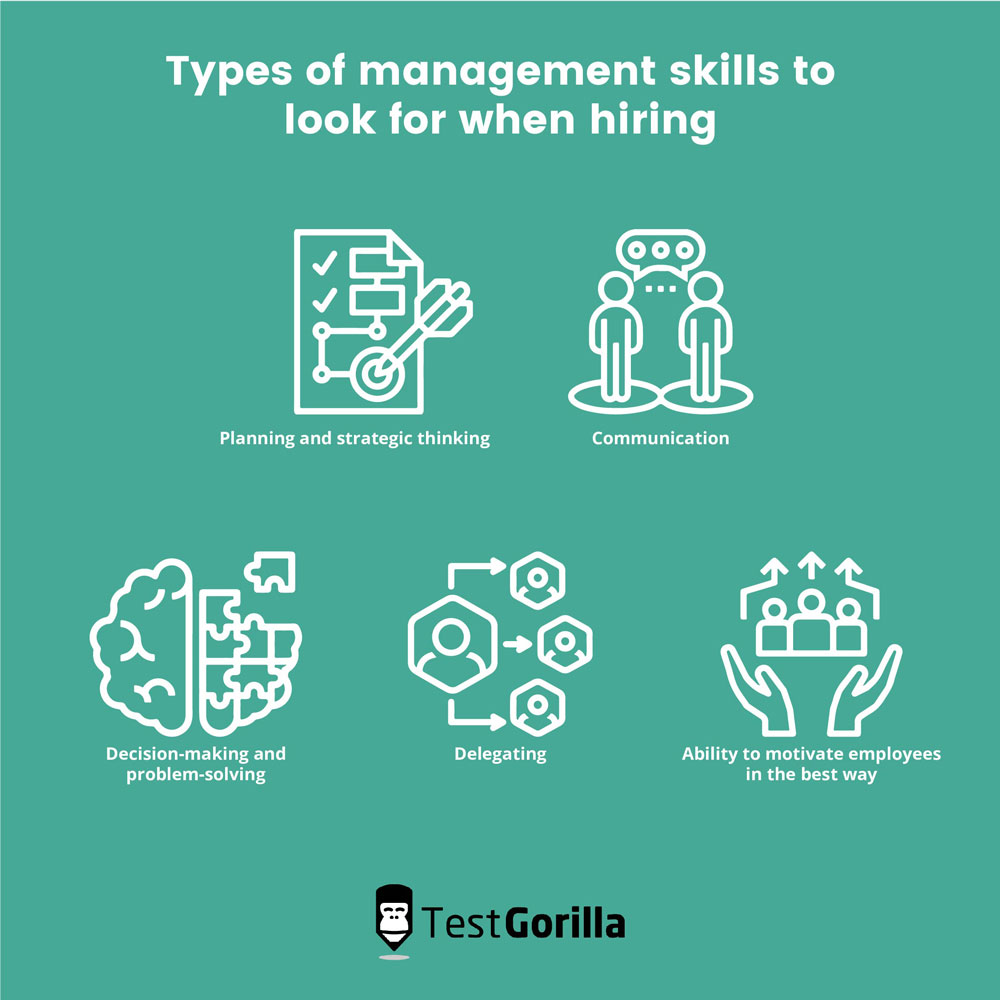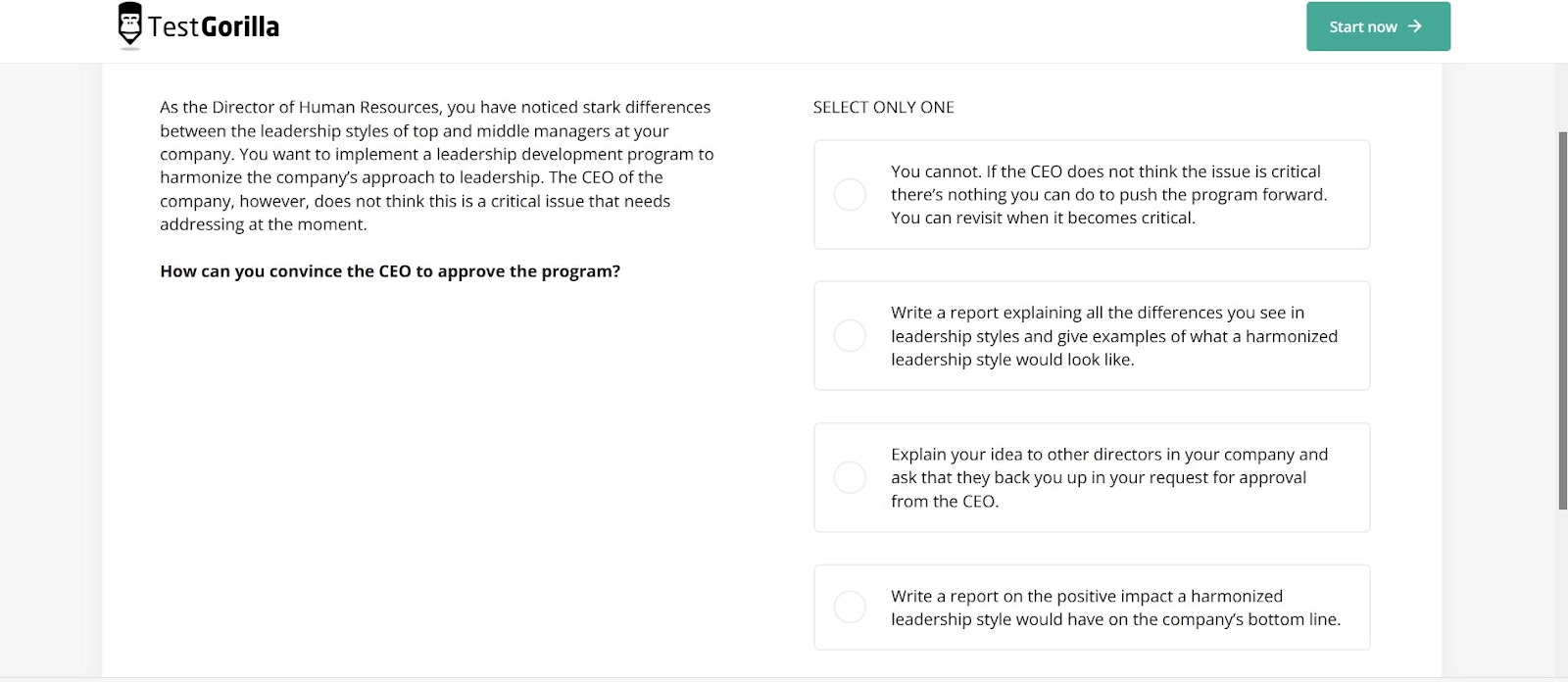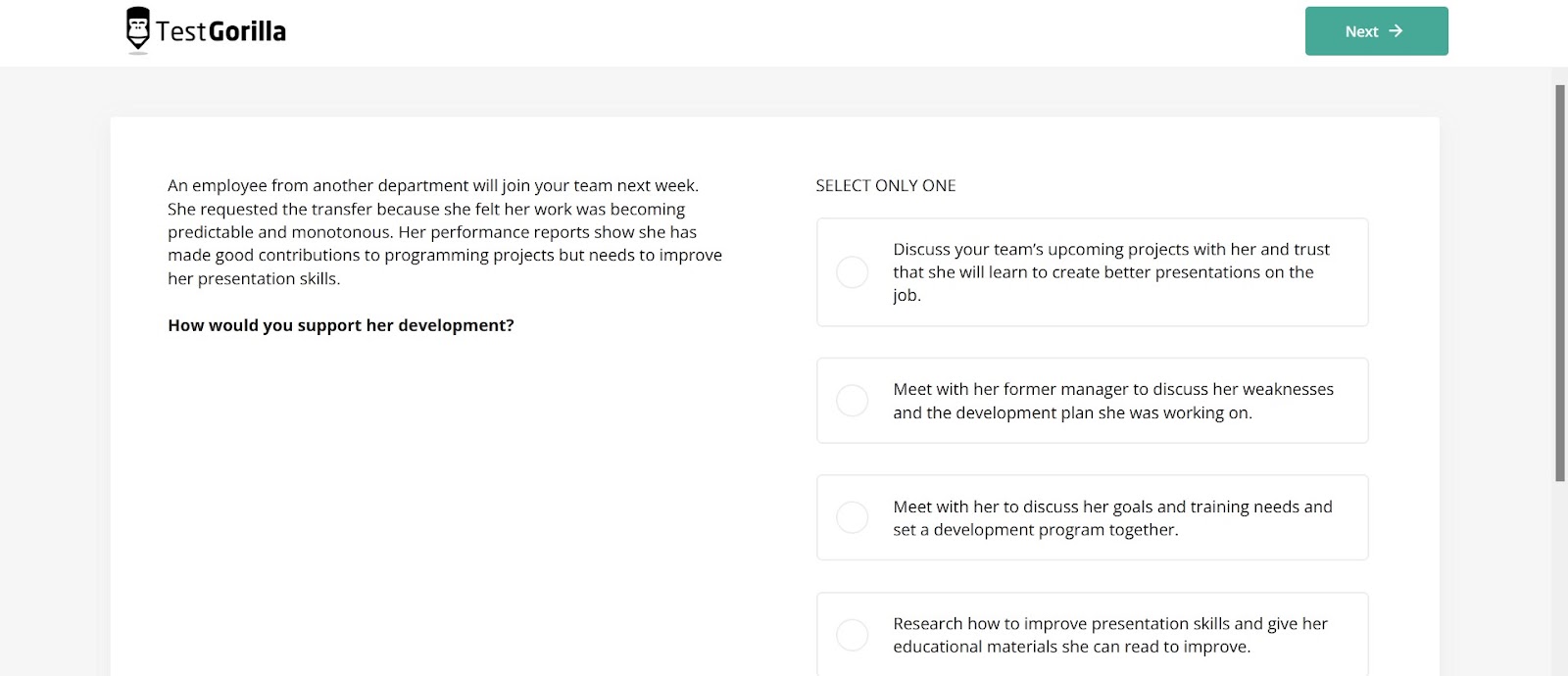What divides a good manager from a bad one? It depends on who you ask, but a key trait of successful managers is their grasp of management skills. But what are those skills, and how can they be measured and tested? When looking for a new manager, it’s crucial for a recruiter or hiring manager to choose the best person for the job, as a wrong move can impact on the business in many ways.
There are various types of managerial skills, but in this article, we’re going to look at the core skills that make a good leader – and the specific traits you should avoid. We’ll also see how a scientifically-backed management test can make your life easier when it comes to picking the right candidate for a management role.
What are management skills?
Managing often looks easy from the outside, but it doesn’t require just one skill: it takes several. Basically, management skills are specific abilities or traits that those in leadership roles should have in order to do their jobs effectively. They include, but aren’t limited to, problem-solving, performing executive tasks, and being good at interacting with colleagues and employees. Managers have to wear several different hats, and they all need to fit perfectly.
Good management and leadership skills are vital for any organization. They are required for a variety of positions, such as supervisors and project managers, as well as top management roles. It can be tricky to carry out a management test, but we’re going to look into a simple and effective method later in the article.
Must-have management skills
Back in 1974, Robert Katz wrote his groundbreaking Skills of an Effective Administrator for the Harvard Business Review. Although attitudes towards women and management recruitment have thankfully come a long way since then, the three skills Katz discussed are still relevant today.
Let’s take a look at them:
1. Technical skills
A manager must be able to use whatever business technology and tools are needed to do the job. If you rely on a platform like Slack for communication within your organization, it’s no good if your new manager doesn’t have a clue how to use it. This is especially true for more specialized software and tools, and technical skills are also needed for specific managerial roles, such as those in marketing, design, finance, IT, product, and sales.
2. Conceptual skills
This one calls for the ability to use abstract thinking, but also means being able to see the business or organization as a whole, and know exactly where everything fits into it. Skills like these enable a manager to evaluate, plan, and strategize, and are particularly valuable in top managerial positions.
3. Interpersonal / human relations skills
This skill is so important, but sometimes overlooked. You’ll no doubt have heard the saying that people don’t leave bad jobs, they leave bad bosses. So many managers have achieved great things in their previous roles that it’s easy to overlook qualities like being able to work with and relate to colleagues and employees.
Good interpersonal skills in a manager go a long way to creating a happy working environment, and can even reduce the number of employees leaving a company. This creates harmony and saves the business money.
The best insights on HR and recruitment, delivered to your inbox.
Biweekly updates. No spam. Unsubscribe any time.
Examples of management skills
We’ve looked at the three basic management skills, but this is just a broad overview. Below, we’ll go a bit deeper, and look at other essential skills that a manager should have in order to run an organization or a department successfully. These abilities are a subset of the main skills listed above:
1. Planning and strategic thinking
Although some managers may not be involved in making company policy and/or strategy, the ability to plan is still a must-have. A manager will need to assign tasks, meet objectives, and be responsible for finding ways to complete projects while staying within budget or time limits.
Managers may also need to be flexible enough to adjust an existing plan to fit new circumstances.
2. Communication
This one is crucial, because managers must be masters of all types of communication. This doesn’t just mean written and verbal communication, but having the ability to listen, too. Managers have to talk with and email or message a variety of people every day, from employees in entry-level positions to chief executives and customers.
Communication is key in creating a trusting and open relationship with employees. Some of the most common communication issues for managers involve a lack of listening skills, talking over others, inconsistent messaging, and not asking enough questions.
3. Decision-making and problem-solving
Oh, decisions, decisions: what to do? We all make decisions and solve problems every day, whether it’s in our working or home life. However, managers have to take this ability to the next level and have great situational judgment skills. Problem-solving usually involves making decisions too, but managers need to be able to consider the longer-reaching impact of those choices.
They often have to make decisions that could affect the company and its employees, so they must be able to weigh the pros and cons of each one. However, they need to balance this with making a firm decision and sticking to it. We probably all know at least one person who agonizes over the smallest decision (tea or coffee?) and then second-guesses themselves. A good manager doesn’t do that.
4. Delegating
Some managers think the only way to get a job done right is to do it themselves, and that delegating is a sign of weakness. Not true. Knowing when and what to delegate is a hugely important skill. In the words of the author and consultant John Baldoni: “If you want to work 160 hours a week, don’t delegate. But you are going to crash and burn.”
Refusing to delegate also tells an employee that they aren’t trusted to do a good-enough job, and this can lead to resentment, unhappiness, and a lack of confidence.
5. Motivating in the best way
The ability to motivate others is a true test of a manager’s leadership skills. Necessity may be the mother of invention, but motivation is what drives us towards our goals. Having the skill to motivate your employees and colleagues will enable them to do their best work, which will make for a happier work environment as well as benefit the company.
Note that we said “motivating in the best way”. There are bad ways in which managers attempt to motivate, such as fear of punishment, comparing employees with each other, playing the favorites game, and belittling people. Yes, this will certainly motivate your employees – to start looking for another job.
Great managers inspire others, lead by example, and treat their employees with fairness and respect. They get to know their team’s strengths and weaknesses, and work with them rather than against them. A motivated team can move mountains or reach the stars.
The impact of bad management
Bad management can have a huge effect on employees’ morale, as well as the company’s profits. Problems with stress, more health issues and time off sick, as well as increased employee turnover, are just some of the ways bad managers leave their mark.
A GoodHire survey from November 2021 shows how American workers really feel about bad bosses. The 3,000 employees surveyed came from a cross-section of the most popular job sectors, and what they had to say about their “horrible bosses” gives a real insight into how severely bad management affects employees.
One of the most telling findings is that American employees really want a manager who is authentic and honest, which (sadly) suggests that the majority of managers are neither of those things. The two biggest dislikes across all job sectors? The overbearing boss who micromanages everything, and the one who expects employees to work outside their working hours.
Would the respondents quit their job because of a bad manager? An 82% majority said yes, and with the global workforce in the grip of the Great Resignation, that makes for sobering reading.
Is there an effective way to test management skills?
So, what can you do to avoid hiring a bad manager? A CV will only tell you so much about your candidate, and it can be easy to be blinded by an impressive list of accomplishments. CVs are great for telling you how much experience a person has, but they don’t tell you much about their people-management style.
What about references, then? Well, according to this article about the reliability of references, employers are reluctant to give bad ones, because they fear it will leave them open to claims of defamation and misrepresentation. So, they tend to stick only to factual information that can’t be disputed.
Another danger is that references are prone to positive bias, because employees will probably pick a referee who has something positive to say about them.
There is another way to help you pick the best candidate, and that is with a management test. TestGorilla’s Leadership & People Management test is bas can be customized so that you ask questions that are relevant to the role. It can help determine a candidate’s ability to delegate authority, give guidance and feedback, plan and support employees’ development, and gain acceptance of ideas.
Here are a couple of example questions to give you an idea of how the test works:
The question above is an example of the style of the management test.
The screenshot above shows a management test question that covers interpersonal skills and communication.
How TestGorilla’s management test can help you hire the best
A management test can take the guesswork out of hiring, and it can save you the thankless hours of combing through a huge pile of CVs looking for the best candidates. A skills test will enable you to go through the results and take a closer look at the highest-scoring candidates, so you can set up interviews with them. It also removes the risk of unconscious bias, which is much fairer to your candidates and enables their skills to shine.
Along with our Leadership and People Management test, you could choose to add extra tests and create an assessment to judge candidates on specific subjects: for example, the Business Ethics and Compliance test evaluates applicants on their knowledge, awareness, and judgment of business ethics. Or you could decide to add a Negotiation Skills test to help you find managers who are also great negotiators.
Want to know how well a candidate will align with your organization’s values? Include the Culture Add test, which enables you to add a list of customized questions to help find candidates with values and behaviors that mesh well with your company culture.
Finding the right manager for your organization can be tricky, but using a management test can take the guesswork out of the process. After all, as Michael Jordan said: “Talent wins games, but teamwork and intelligence win championships.”
Get started with TestGorilla today and take a look at our huge library of skills tests. You can also check out our blog for more in-depth articles on all aspects of hiring and pre-employment testing.
You've scrolled this far
Why not try TestGorilla for free, and see what happens when you put skills first.
























